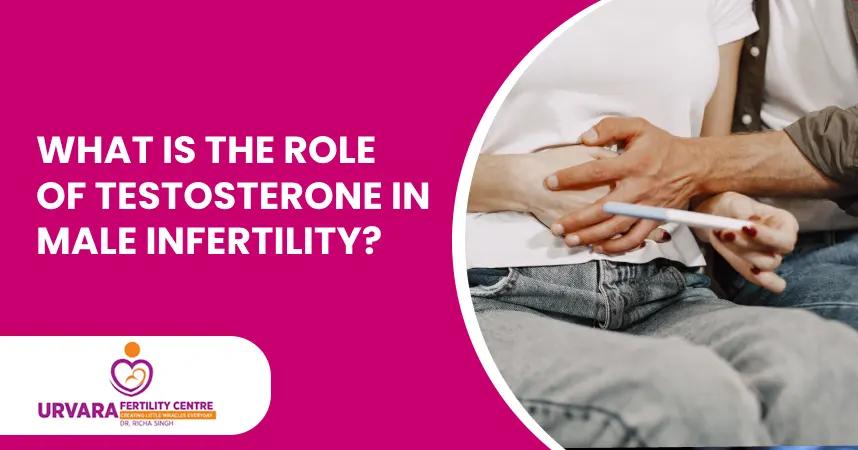
What is the role of testosterone in male infertility?
What is the role of testosterone in male infertility?
When we think of testosterone, we often link it with strength, energy, or masculinity. But there’s more to it — especially when it comes to fertility. For men trying to start a family, testosterone plays a quiet but powerful role behind the scenes. It helps the body produce healthy sperm and supports the entire process of reproduction.
But here’s the surprising part: having high or low testosterone doesn’t always mean what we think it does — especially when it comes to fertility. In fact, both extremes can affect a man’s ability to father a child.
In this blog, we’ll break down what testosterone really does, how it’s connected to sperm health, and when it might become a concern. Let’s keep it honest, clear, and easy to understand — because fertility is already emotional enough without complicated medical talk.
What is Testosterone?
Testosterone is a hormone made mostly in a man’s testicles. A small amount also comes from the adrenal glands. It plays an important role in making sperm and supporting a healthy reproductive drive (libido). Simply put, without enough testosterone, the body may struggle to produce good-quality sperm.
1. How Does Testosterone Affect Male Fertility?
Testosterone plays a quiet but powerful role in a man’s ability to have children. While it’s often seen as the “male hormone” responsible for physical traits like muscle mass or facial hair, its role in fertility goes much deeper.
Inside the testicles, testosterone works hand-in-hand with other hormones to support the production of sperm. Without the right amount of testosterone, the body may struggle to make healthy sperm — or enough of it.
It doesn’t directly create sperm, but it sets the stage. It supports the function of the seminiferous tubules (the place where sperm is made) and keeps the sperm development process going smoothly. If testosterone levels drop too low, this process can slow down or stop, leading to low sperm count, poor motility, or abnormal sperm shape — all of which can make it harder to conceive.
But here’s something important: high testosterone levels aren’t always better. In fact, using testosterone supplements without medical advice can shut down natural sperm production altogether. That’s why proper hormone balance — not just “more testosterone” — is key for male fertility.
In short, testosterone doesn’t work alone, but without it, the body’s whole fertility system can feel out of sync. And that’s where careful testing and expert guidance become so important.
2. Can Low Testosterone Cause Infertility?
Yes, it can — but the connection isn’t always straightforward.
Low testosterone can interfere with your body’s ability to produce sperm. Testosterone works together with other hormones to support the entire sperm-making process. So, when levels drop too low, this process can slow down or even stop. In some cases, men with very low testosterone might have a reduced sperm count, poor sperm movement, or no sperm at all.
But here's what many people don’t realize: not every man with low testosterone is infertile, and not every man with fertility issues has low testosterone. It’s just one piece of a much bigger hormonal puzzle.
Also, taking testosterone supplements without proper medical advice can actually make things worse. These treatments can signal your body to stop producing natural testosterone and sperm — leading to even lower fertility.
Symptoms of Low Testosterone in Men
Sometimes, low testosterone shows up quietly — with small signs that are easy to miss. Other times, it makes itself known in ways that can really affect how a man feels, both physically and emotionally.
When testosterone levels drop below normal, it can impact much more than just fertility. You might notice changes in your energy, mood, or even how you sleep.
Here are some common signs to look out for:
- Low drive or interest in intimacy – A noticeable drop in desire
- Fatigue – Feeling tired all the time, even after rest
- Mood swings or irritability – Feeling more anxious, down, or short-tempered
- Loss of muscle mass – Muscles may feel weaker or shrink over time
- Weight gain – Especially around the belly
- Reduced beard or body hair growth – Hair may grow slower or thinner
- Trouble concentrating – Foggy thinking or forgetfulness
- Erectile difficulties – Struggling to get or keep an erection.
Some men also experience poor sleep or a general feeling of “not feeling like themselves.” And while these symptoms could be caused by many things, when several show up together, it’s worth getting your hormone levels checked.
How Is Low Testosterone Diagnosed?
If you’re noticing signs like tiredness, low energy, or a dip in your drive, it’s easy to feel unsure about what’s going on. But the good news is — checking your testosterone levels isn’t complicated, and it starts with a simple blood test.
Usually, doctors recommend getting your blood drawn in the morning, when testosterone levels are naturally at their highest. This gives a more accurate picture of what your body is producing. The test measures something called “total testosterone,” and if the levels are lower than expected, your doctor may do a few more tests to dig deeper.
They might also look at:
- FSH (Follicle-Stimulating Hormone)
- LH (Luteinizing Hormone)
- Prolactin or Thyroid levels — because these can also affect testosterone production
But here's something that matters just as much as the numbers: how you feel. A doctor will also ask about your symptoms, lifestyle, stress levels, and even sleep — because all these factors are connected.
Content Created By:

Cyberbizz Technologies
Team - Content Curator

